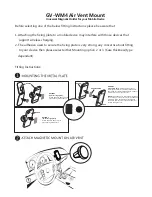
Safety Guidelines
119
“compatible” hearing aid at the same time.
This standard was approved by the IEEE in
2000.
The FDA continues to monitor the use of
wireless phones for possible interactions
with other medical devices. Should harmful
interference be found to occur, the FDA will
conduct testing to assess the interference and
work to resolve the problem.
12. Where can I find additional
information?
For additional information, please refer to the
following resources:
FDA web page on wireless phones
(http://www.fda.gov/cellphones/)
Federal Communications Commission (FCC) RF
Safety Program
(http://www.fcc.gov/oet/rfsafety)
International Commission on Non-lonizing
Radiation Protection
(http://www.icnirp.de)
World Health Organization (WHO)
International EMF Project
(http://www.who.int/emf)
National Radiological Protection Board (UK)
(http://www.hpa.org.uk/radiation/)
Driving
Check the laws and regulations on the use
of wireless phones in the areas where you
drive and always obey them. Also, if using
your phone while driving, please observe the
following:
Ź
Give full attention to driving -- driving
safely is your first responsibility;
Ź
Use hands-free operation, if available;
Ź
Pull off the road and park before making or
answering a call if driving conditions or the
law require it.
10 Driver Safety Tips
Your wireless phone gives you the
powerful ability to communicate by voice
almost anywhere, anytime. An important
responsibility accompanies the benefits of
wireless phones, one that every user must
uphold.
When operating a car, driving is your first
responsibility. When using your wireless






































